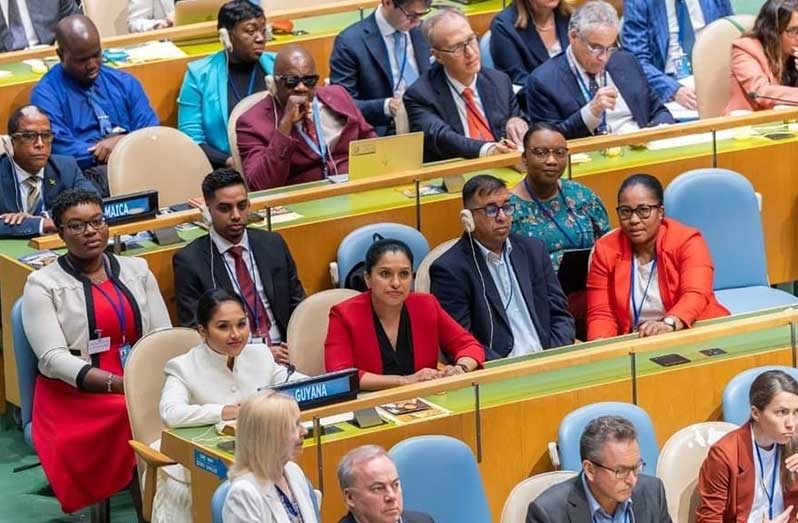ACROSS the globe, developing nations grapple with significant difficulties in offering essential aid to persons with disabilities, a predicament further complicated by the limited human and financial resources accessible to specific states.
Cognisant of these challenges, Guyana’s First Lady Arya Ali has voiced a passionate and strong call for greater international financing for disability-inclusive development in developing countries during her contribution to the 17th Session of the Conference of States Parties to the Convention on the Rights of Persons with Disabilities at United Nations, New York Head Quarters on Tuesday.
During her remarks, the First Lady highlighted that there are limited institutional, technological and financial capacities in small developing states.
“In a truly inclusive and sustainable world, persons with disabilities must be empowered to live a life with dignity and respect; a life where they can realise their potential. What is the reality? In developing countries, the majority of persons with disabilities of working age are unemployed and many children with disabilities do not attend school,” First Lady Ali said.
Guyana, she added has taken a ‘life course’ approach to supporting persons living with disabilities.
Guided by the UN, the country has an established a registrar of persons living with disabilities to guide the relevant authorities in forming policies and interventions.
“The adoption of the Convention on the Rights of Persons with Disabilities created necessary momentum for removing institutional and attitudinal barriers and promoting the full participation of persons with disabilities in society. Guided by the Convention, Guyana enacted disabilities legislation and adopted a multifaceted approach to ensure that persons with disabilities enjoy equal treatment, focusing on education and empowerment,” she explained.
Highlighting several strides made by Guyana to create an inclusive economic landscape, the First Lady noted that all persons living with permanent disabilities are eligible to receive monthly financial assistance. Additionally assistive and mobility aids are also provided free of cost and specialised support is given for children through the widespread training of teachers.
Further, she disclosed that Guyana through the establishment of a disability complex has been able to train and empower persons living with disabilities.
The Mahaica Disability Complex not only provides vital skills training but allows citizens to access business grants and interest-free loans.
Concurrently, Guyana is developing a Business Centre to advance financial independence and economic empowerment of persons with disability.
This, according to the First Lady, will see persons living with disabilities in Guyana being able to meaningfully contribute to the country’s growing economy.
“Guyana is placing emphasis on enhancing digital connectivity and using technology to provide learning opportunities for persons with disabilities,” she said.
The First Lady was joined by Ravin Singh, Director of Projects, Policy & Public Affairs, Office of the First Lady, Dr. Ariane Mangar, Director of Disability and Rehabilitation, Ministry of Health and Mr. Ganesh Singh, Programme Manager, Guyana Council of Organisations for Persons with Disabilities.
Ambassador Trishala Persaud, Deputy Permanent Representative, Marissa Edwards, Minister Counsellor, Stephanie Savory, First Secretary and Abosede Hazlewood, Second Secretary comprised the team from Guyana’s Permanent Mission to the UN.
Meanwhile the President of the UN’s General assembly, Dennis Francis reminded that there are about 1.3 billion persons living with disabilities, with women and children being the most vulnerable.
“We must ensure that persons with disabilities are actively involved in all aspects of life and on an equal basis with others. The CRPD is the first comprehensive human rights treaty with a clear Social Development dimension, advancing Disability Rights worldwide with 190 States Parties,” the diplomat said.
He further highlighted the need for effective expressions and inclusion of marginalissed groups, particularly for children living with disability.
“Over the years this Conference of States Parties has become the most important forum to promote and to protect these rights as important as they are, by way of taking stock of the global status,” Francis noted.
The Convention on the Rights of Persons with Disabilities and its Optional Protocol was adopted in December 2006 at the United Nations Headquarters in New York.
According to the United Nations, the Convention follows decades of work by the United Nations to change attitudes and approaches to persons with disabilities.
The Convention is intended as a human rights instrument with an explicit social development dimension. It adopts a broad categorisation of persons with disabilities and reaffirms that all persons with all types of disabilities must enjoy all human rights and fundamental freedoms.



.jpg)









